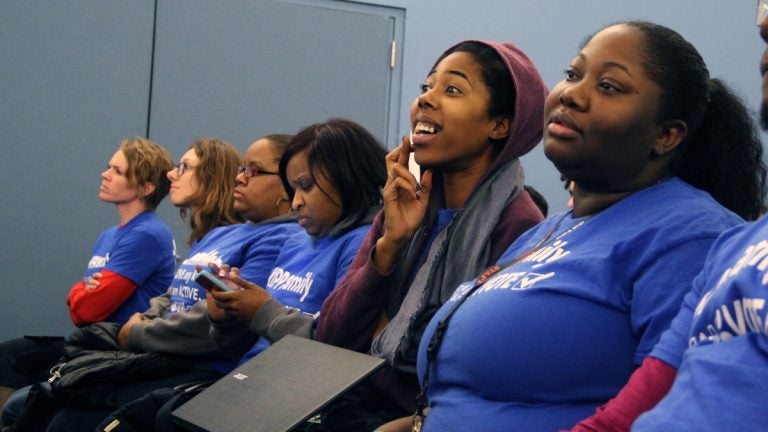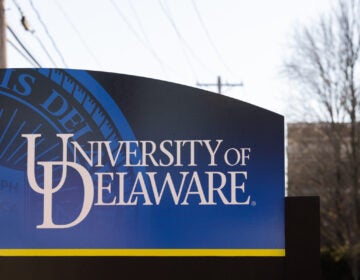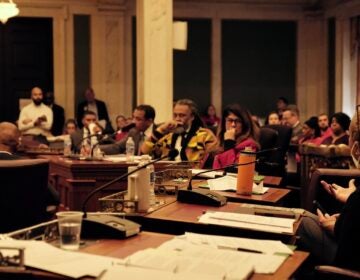Philly SRC approves 3 of 12 charter applications amid bombshell Pa. Supreme Court ruling

KIPP charter school supporters wait to hear whether applications for two new charters will be approved. (Emma Lee/WHYY)
The Philadelphia School Reform Commission voted to approve three new charter schools Tuesday night – increasing the city’s charter options by 2,024 seats. SRC members also were caught off guard by a new ruling by the Pennsylvania Supreme Court.
Of twelve applicants, the SRC approved a middle school run by Russell Byers in Center City, a K-12 school run by KIPP in Strawberry Mansion, and an elementary school in run by Esperanza in Hunting Park.
None will open until the 2017-18 school year. The final agreements will depend on the operators consenting to the SRC’s requested conditions.
The SRC wants Esperanza and Russell Byers to agree to fewer students than they had requested, while granting only a three-year charter instead of five.
Specifically, the SRC asked Russell Byers to either reduce requested enrollment from 320 to 214 in its middle school, or accept an amendment to its existing elementary school charter that would allow middle grades, but cap total enrollment at 699.
Similarly, the SRC asked Esperanza to either reduce requested enrollment from 800 to 430 in its elementary school, or agree to a K-12 charter that would cap total enrollment at 800.
The SRC agreed to a five-year deal with KIPP to open a K-12 school in Strawberry Mansion serving 1,380 student’s. KIPP’s application to open a new school in West Philadelphia was denied.
KIPP CEO Marc Mannella was puzzled because the applications were “really similar,” but he stressed an upbeat tone.
“We’re really focused on the positive tonight,” he said. The SRC delivered KIPP a similarly mixed message last February. Ultimately, KIPP overcame its denial with a successful resubmission.
Before the votes, state Sen. Vincent Hughes urged the SRC to consider the fiscal toll that authorizing new charters would take on the district’s resource-strapped schools. And he warned against banking on Gov. Tom Wolf’s massive education funding proposals.
“Quite frankly there’s no end in sight with respect to new funding from Harrisburg,” said Hughes (D-Philadelphia).
But the SRC does not believe it can take that information into account, as Commissioner Bill Green explained in his response to Hughes.
“The one thing Pennsylvania law does not permit is for us to consider the finances of the district in the approval or denial of a charter application,” said Green.
District officials could not immediately put a dollar figure on how much the more than 2,000 new seats could cost.
Supreme shake-up
In the midst of the meeting — unrelated to the business at hand — the Pennsylvania Supreme Court delivered a long-awaited ruling that could have widespread implications on city public schools.
The court ruled that the SRC does not have special powers to suspend sections of the school code.
Writing the majority opinion in a 4-2 bipartisan decision, Chief Justice Thomas G. Saylor argued that the legislature overstepped its authority in granting these powers when it crafted the state-takeover legislation that created the SRC in 2001.
Justices Debra McCloskey Todd, Kevin Dougherty, and David Wecht joined the majority opinion.
Based on the state takeover legislation, the SRC has felt justified over the years to bypass the school code. In two instances that could now have huge implications if reversed, the SRC ignored seniority protections when recalling employees from layoffs, and also bypassed the code when it unilaterally imposed enrollment restrictions on charter schools.
District leaders and commissioners were still processing the Court’s decision as the meeting came to a close.
The district itself was not ready Tuesday night to respond.
Offering early reactions, Commissioner Green feared the ruling could have catastrophic fiscal and academic implications.
“This kind of pulls the rug out from many of policies we have taken to try to improve the quality of education for children in Philadelphia,” said Green. “It will cost the district probably millions, if not tens of millions of dollars.”
Green worried that the decision would require a mass “reshuffling of all teachers in the district this year” in an attempt to re-impose seniority.
“The consequences are not clear to me, but it could be disastrous for children,” he said.
Green also lamented the possible “unfettered expansion” of the city’s worst charter operators.
“It takes resources from the district,” he said, “but it also puts families and children who think they are getting a better option — who are not — in a much worse situation than in their district schools.”
The Philadelphia Federation of Teachers called the ruling a “double-edged sword,” one that benefits both union members and charter schools.
“Though it seems to place much-needed checks and balances on an SRC run amok, it also has the potential to put our school district finances in an extremely precarious position,” wrote President Jerry Jordan in a statement.
This is an ongoing story. WHYY/Newsworks will have more analysis and reaction to Supreme Court’s decision Wednesday.
WHYY is your source for fact-based, in-depth journalism and information. As a nonprofit organization, we rely on financial support from readers like you. Please give today.





